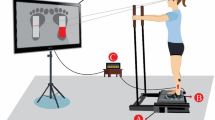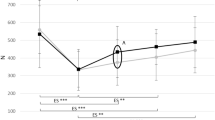Abstract
To examine the fatigue-induced adaptive changes (e.g., timing) of anticipatory postural adjustments (APAs), APAs of 30 research participants were recorded before (baseline) and after (post-test) conditions of either rest (control group, n = 15) or fatigue (fatigue group, n = 15). Muscle fatigue was generated using a dead-lift exercise performed to exhaustion. Self-initiated postural perturbations were induced using a rapid unilateral arm-raising maneuver (focal movement), and APAs were obtained using electromyography (EMG) recorded bilaterally in the lumbar and thoracic paraspinal muscles as well as the hamstring muscles. Postural stability during the focal movement was assessed using a force plate. Results showed that fatigue had no effect on postural stability during the focal movement, and yet caused earlier APA onsets in three of the six muscles evaluated. In spite of early APA activation, the APA EMG integrals of two of the three postural control muscles which exhibited fatigue-induced early APA onsets (T9 and L4 contralateral paraspinals) did not differ between baseline and post-test measures. The findings suggest that early APA onset may enhance postural stability by permitting a longer duration APA which can counteract fatigue-induced decreases in the force-producing capability of muscles that contribute to postural stability.




Similar content being viewed by others
References
Allison GT, Henry SM (2002) The influence of fatigue on trunk muscle responses to sudden arm movements: a pilot study. Clin Biomech 17:414–417
Allison GT, Fujiwara T (2002) The relationship between EMG median frequency and low frequency band amplitude changes at different levels of muscle capacity. Clin Biomech 17:464–469
Aruin AS, Latash ML (1995a) Directional specificity of postural muscles in feed-forward postural reactions during fast voluntary arm movements. Exp Brain Res 103:323–332
Aruin AS, Latash ML (1995b) The role of motor action in anticipatory postural adjustments studied with self-induced and externally triggered perturbations. Exp Brain Res 106:291–300
Aruin AS, Neyman I, Nicholas JJ, Latash ML (1996) Are there deficits in anticipatory postural adjustments in Parkinson’s disease? Neuroreport 7:1794–1796
Aruin AS, Forrest WR, Latash ML (1998) Anticipatory postural adjustments in conditions of postural instability. Electroencephalogr Clin Neurophysiol 109:350–359
Bell DG (1993) The effect of air temperature on the EMG/force relationship of the quadriceps. Eur J Appl Physiol 67:256–260
Bonnetblanc F, Martin O, Teasdale N (2004) Pointing to a target from an upright standing position: anticipatory postural adjustments are modulated by the size of the target in humans. Neurosci Lett 358:181–184
Corbeil P, Blouin J, Begin F, Nougier V, Teasdale N (2003) Perturbation of the postural control system induced by muscular fatigue. Gait Posture 18:92–100
Deluca CJ (1997) The use of surface electromyography in biomechanics. J Appl Biochem 13:135–163
Derave W, Tombeux H, Cottyn J, Pannier J, De Clercq D (2002) Treadmill exercise negatively affects visual contribution to static postural stability. Int J Sports Med 23:44–49
Dickstein R, Shefi S, Marcovitz E, Villa Y (2004) Anticipatory postural adjustment in selected trunk muscles in post stroke hemiparetic patients. Arch Phys Med Rehabil 85:261–267
Farina D, Gazzoni M, Merletti R (2003) Assessment of low back muscle fatigue by surface EMG signal analysis: methodological aspects. J Electromyogr Kinesiol 13:319–332
Fischman M (1984) Programming time as a function of number of movement parts and changes in movement direction. J Mot Behav 16:405–423
Gandevia S (2001) Spinal and supraspinal factors in human muscle fatigue. Physiol Rev 81:1725–1789
Hashibe M (1998) Transient change in standing posture after linear treadmill locomotion. Jpn J Physiol 48:499–504
Heiss DG, Shields RK, Yack H (2002) Balance loss when lifting a heavier-than-expected load: affects of lifting technique. Arch Phys Med Rehabil 83:48–59
Hodges PW (2001) Changes in motor planning of feedforward postural responses of the trunk muscles in low back pain. Exp Brain Res 141:261–266
Hodges PW, Bui BH (1996) A comparison of computer-based methods for the determination of onset of muscle contraction using electromyography. Electromyogr Clin Neurophysiol 101:511–519
Hodges PW, Richardson CA (1996) Inefficient muscular stabilization of the lumbar spine associated with low back pain: a motor control evaluation of transversus abdominis. Spine 21:2640–2650
Hodges PW, Richardson CA (1999) Altered trunk muscle recruitment in people with low back pain with upper limb movement at different speeds. Arch Phys Med Rehabil 80:1005–1012
Hodges PW, Moseley GL, Gabrielsson A, Gandevia SC (2003) Experimental muscle pain changes feedforward postural responses of the trunk muscles. Exp Brain Res 151:262–271
Horak FB, Nashner LM (1986) Central programming of postural movement: adaptation to altered support-surface configurations. J Neurophysiol 55:1369–1381
Johnston III RB, Howard ME, Cawley PW, Loose GM (1998) Effect of lower extremity muscular fatigue on motor control performance. Med Sci Sports Exerc 30:1703–1707
Kankaanpaa M, Taimela A, Laaksonen D, Hanninen O, Airaksinen O (1998) Back hip extensor fatigability in chronic low back pain patients and control. Arch Phys Med Rehabil 79:412–417
Krogh-Lund C (1993) Myo-electric fatigue and force failure from submaximal static elbow flexion sustained to exhaustion. Eur J Appl Physiol 12:413–430
Lee WA, Buchanan TS, Rogers MB (1987) Effect of arm acceleration and behavioral conditions on the organization of postural adjustments during arm flexion. Exp Brain Res 66:257–270
Maton B, Gamet D (1989) The fatigability of two agonistic muscles in human isometric voluntary submaximal contraction: an EMG study. II. Motor unit firing rate and recruitment. Eur J Appl Physiol 58:369–374
Morris SL, Allison GT (2006) Effects of abdominal muscle fatigue on anticipatory postural adjustments associated with arm raising. Gait Posture (in press)
Morrish G (1999) Surface electromyography: methods of analysis, reliability, and main applications. Crit Rev Phys Rehabil Med 11:171–205
Nardone A, Tarantola J, Girodano A, Schieppati M (1997) Fatigue effects on body balance. Electroencephalogr Clin Neurophysiol 105:309–320
Nashner LM (1976) Adapting reflexes controlling the human posture. Exp Brain Res 26:59–72
Peek-Asa C, McArthur DL, Kraus JF (2004) Incidence of acute low-back injury among older workers in a cohort of material handlers. J Occup Environ Hyg 1:551–557
Puniello MS, McGibbon CA, Krebs DE (2001) Lifting strategy and stability in strength-impaired elders. Spine 26:731–737
Shiratori T, Aruin AS (2004) Anticipatory postural adjustments associated with rotational perturbations while standing on fixed and free-rotating supports. Clin Neurophysiol 115:797–806
Skinner HB, Wyatt MP, Hodgdon JA, Conrad DW, Barrack RL (1986) Effect of fatigue on joint position sense of the knee. J Orthop Res 4:112–118
Sparto PJ, Parnianpour M, Reinsel T, Simon S (1997) Spectral and temporal response of trunk extensor electromyography to an isometric endurance test. Spine 22:418–426
Stevenson J, Bryant T, Greenhorn D, Deakin J, Smith T (1995) Development of factor-score-based models to explain and predict maximal box-lifting performance. Ergonomics 38:292–302
Vuillerme N, Nougier V, Teasdale N (2002) Effects of lower limbs muscular fatigue on anticipatory postural adjustments during arm motions in humans. J Sports Med Phys Fitness 42:289–294
Weiss A (1965) The locus of reaction time change with set, motivation, and age. J Gerontol 20:60–64
Yamazaki Y, Masataka S, Ohkuwa T, Itoh H (2005) Maintenance of upright standing posture during trunk rotation elicited by rapid and asymmetrical movements of the arms. Brain Res Bull 67:30–39
Zattara M, Bouisset S (1988) Posturo-kinetic organization during the early phase of voluntary upper limb movement in normal subjects. J Neurol Neurosurg Psychiatry 51:956–965
Author information
Authors and Affiliations
Corresponding author
Rights and permissions
About this article
Cite this article
Strang, A.J., Berg, W.P. Fatigue-induced adaptive changes of anticipatory postural adjustments. Exp Brain Res 178, 49–61 (2007). https://doi.org/10.1007/s00221-006-0710-5
Received:
Accepted:
Published:
Issue Date:
DOI: https://doi.org/10.1007/s00221-006-0710-5




